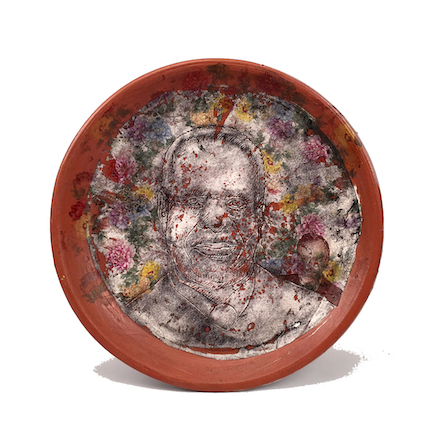(NORTH ADAMS, Mass.) – Clay Politics, a conversation between artist Justin Rothshank and Elenor Wilson, editor of Studio Potter Journal, in conjunction with the exhibition Know Justice, a two-person show of work by Justin and Brooke Rothshank focusing on American politics, the Supreme Court, and presidential history, takes place at Ferrin Contemporary Gallery on the campus of MASS MoCA on Saturday, October 15, at 4pm.
Justin Rothshank’s work uses photographic collages he creates from images sourced from public domain web imagery and applies as decal transfer prints onto hand-thrown dinnerware, pitchers, trophies, and objects used in ceremony. Brooke Rothshank’s miniatures are hand-painted watercolors featuring the Supreme Court justices, significant buildings, and singular objects related to the court.
Their collaborative works feature Brooke’s finely drawn and carved portraits of the nine justices and their presidential nominators on Justin’s hand thrown and decorated platters.
Through this exhibition and its installation, the artists share their interest in the current judicial and political systems with the goal of documentation and encouraging reflection on powerful individuals and their roles within our political system.
From an artists’ statement:
“We believe that artwork and creativity are a catalyst for social change and economic improvement as well as enhancing everyday lives with beauty. Art gives a voice to the voiceless, enables self understanding, and provides a window into other cultures. These are among the reasons we have chosen to pursue lives as working artists.”
“We’ve grown up and live in a Mennonite community where simplicity, functionality, craftsmanship, and knowledge have been valued and taught. These values have shaped our personal and professional lives. At times, its been difficult to see where fine art and craft fit within this context, but these have also felt like important themes to fall back on.
“This show is about a general introduction of the Supreme Court Justices, and our country’s long history of elected government leadership. The supreme court has shaped the laws of our country for generations. Perhaps more now than ever before the court has become part of the context of political and social conversation. Knowing these leaders, how they lean politically, who appointed them, and what they stand for is a way to start a conversation about how justice is shaped in our country.
 “This show is about the conversation. What we make is simple and functional. We value good craftsmanship and knowledge. Our pots and paintings are influenced by our own research, and also by the framework in which we live. They are distinctly American, but shaped by our awareness of a larger world view.”
“This show is about the conversation. What we make is simple and functional. We value good craftsmanship and knowledge. Our pots and paintings are influenced by our own research, and also by the framework in which we live. They are distinctly American, but shaped by our awareness of a larger world view.”



